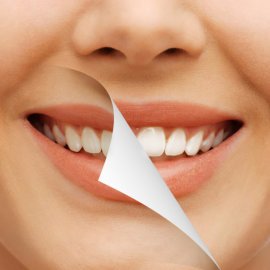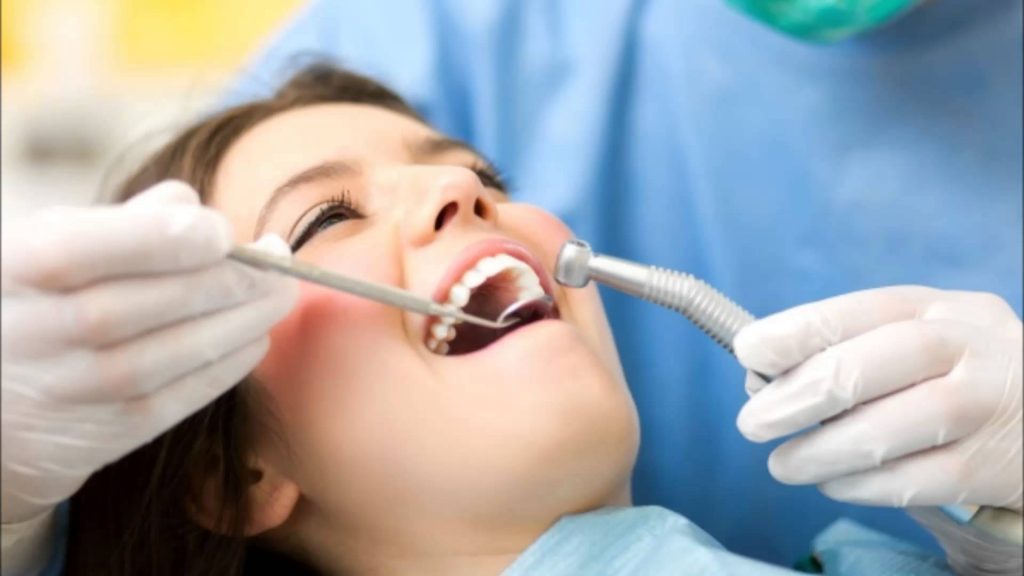Dentist Explains the Different Stages of Gum Disease
July 26, 2019

Most people have experienced bleeding gums at some point while brushing, but did you know that the infection responsible is also the leading cause of adult tooth loss? Despite being a widespread condition, most people aren’t properly educated on the various stages of gum disease. To best protect yourself from this condition, you need to know the causes and health risks of each stage. In this post, your dentist will differentiate between gingivitis and periodontitis to help you stay healthy and happy.
(more…)COMMON ADULT QUESTIONS – PART 4/4
July 15, 2019

This is the final column of this series. If you missed any of the past segments, you can find them at www.thetowncommon.com.
I’ve heard of some new cosmetic techniques that can improve smiles. Are they appropriate for older adults?
Older adults can benefit from many of the options available today for improving the look of a smile. Your dentist can describe and discuss with you the range of treatments that would be right for you. Part of older adulthood is the acceptance of aging and the development of realistic expectations for appearance. In that context, dental treatment for older adults can be a healthy and adaptive way of maintaining dental health and emotional well-being.
Our teeth and mouth play a critical role in psychological development and well-being throughout our lives. Modern dentistry has expanded esthetic options for people of all ages. Coupled with good oral hygiene and regular dental visits, cosmetic techniques can help improve the appearance of your smile.
I’m on a limited, fixed income and can’t really afford regular dental treatment. Are there any resources available to help me?
Even if you cannot pay for dental care, you don’t need to live without it. Thousands of dentists across the country assist the elderly on fixed incomes by offering their services at reduced fees through dental society-sponsored assistance programs. The availability of such aid varies from one community to another, so call your local dental society for information about where you can find the nearest assistance programs and low-cost dental care locations, such as public health and dental school clinics. Other sources of such information are local social service organizations.
What is dentistry doing to better serve older adults?
Dentists are experiencing a quiet revolution in their offices as the number of older patients increases steadily. The profession knows that this burgeoning population group is wearing fewer dentures and is keeping natural teeth longer. Also, we know that some patients in this group require special consideration because reduced mobility and dexterity may make daily oral hygiene difficult. In addition, medical conditions and impairment are factors that dentists take into account for certain patients.
Sometimes, lack of awareness about available treatments and techniques leads older patients to make false assumptions about their dental health and tolerate conditions such as toothaches, bleeding gums and clicking dentures. Dentists are gaining practical information on how to effectively manage the treatment needs of older patients. Many dental societies have set up access programs to assist older adults, individuals with physical or mental disabilities or indigent persons to receive care.
The dental profession is increasingly sensitive to the special needs of and the importance of dental health in the older patient. Older adults are more health conscious as a group than ever before. Their oral health is an important part of their overall health and the dental profession is committed to providing the treatment and guidance older adults need to maintain it.
Dr. St. Clair maintains a private dental practice in Rowley and Newburyport dedicated to health-centered family dentistry. If there are certain topics you would like to see written about or questions you have please email them to him at jpstclair@stclairdmd.com. You can view all previously written columns at www.jpeterstclairdentistry.com/blog.
COMMON ADULT QUESTIONS – PART 3/4
July 8, 2019

I find that some foods have become difficult to chew and swallow. Do I really need to eat the same amount or variety of food that I did when I was younger?
Maintaining proper nutrition is important for everyone, young or old. Many older adults do not eat balanced diets and avoid meats, raw vegetables and fresh fruits because they have trouble chewing or swallowing. These problems can be caused by painful teeth, ill-fitting dentures, dry mouth or changes in facial muscles. Others find their sense of taste has changed, sometimes due to a disease or certain medications.
Because of these and other factors, the diets of older adults are often lacking in calcium, protein and other nutrients essential to dental and overall health. You need a balanced diet.
If you are unable to eat certain things that you enjoy and contribute to a well-balanced diet, address the reason this is a problem. Consult your physician, nutritionist and dentist about the possible use of supplements to make up for the parts of your diet that are lacking.
Why do my teeth seem darker?
One of the changes you may notice as you grow older is that it’s harder to keep your teeth clean and white. This is because the sticky, colorless layer of bacteria, called plaque, can build up faster and in greater amounts as we age. Changes in dentin, the bone-like tissue that is under your enamel, may also cause your teeth to appear slightly darker.
Regular professional dental hygiene visits are vital to maintaining and monitoring your oral health. For most, professional teeth bleaching is a cost-effective way to brighten your smile.
Why does my mouth feel dry?
Reduced saliva flow that results in a dry mouth is a common problem among older adults. It is caused by certain medical disorders and is often a side effect of medications such as antihistamines, decongestants, pain killers and diuretics. Some of the common problems associated with dry mouth include a constant sore throat, burning sensation, problems speaking, difficulty swallowing, hoarseness or dry nasal passages. Left untreated, dry mouth can damage your teeth. Without adequate saliva to lubricate your mouth, wash away food, and neutralize the acids produced by plaque, extensive cavities can form.
Your dentist can recommend various methods to restore moisture. Sugar-free candy or gum stimulates saliva flow, and moisture can be replaced by using artificial saliva and oral rinses. Xylitol, a sugar alcohol used as a sweetener, is found in many of these products and also has the benefit of being anti-cavity.
Why am I losing my sense of taste?
You may find that you are losing your appetite due to a change in your sense of taste. Several factors can cause this change. Besides an age-related decrease in the sense of taste and smell, certain diseases, medications and dentures can contribute to a decrease in your sense of taste. You should make your physician aware of this.
I’ve heard about implants as an alternative to dentures. What should I know about implants?
Dental implants can be used in many ways and may offer solutions for patients who cannot function adequately with conventional dentures. However, not every patient is a candidate for implants. The decision can be made only after a careful examination by your dentist and discussion of the relative benefits and risks and what the procedure involves. Ask your dentist if implants may be an option for you.
Dr. St. Clair maintains a private dental practice in Rowley and Newburyport dedicated to health-centered family dentistry. If there are certain topics you would like to see written about or questions you have please email them to him at jpstclair@stclairdmd.com. You can view all previously written columns at www.jpeterstclairdentistry.com/blog.
COMMON ADULT QUESTIONS – PART 2/4
July 1, 2019

I understand that periodontal disease is a major cause of tooth loss in adults, but is there anything I can do about it?
Gum disease—periodontal disease—often progresses slowly, without pain, over a long period of time. This is one reason why it is common among older adults. The longer the disease goes undetected and uncontrolled, the more damage it causes to gums and other supporting tissues. Although periodontal disease is caused by bacteria, other factors can increase the risk or severity of the condition. These include food left between the teeth, smoking, smokeless (spit) tobacco use, badly aligned teeth, ill-fitting bridges or partial dentures, poor diets and some systemic diseases such as diabetes.
Although periodontal disease is common, it can be controlled or arrested. In its early stages, it can be reversed. Treatment of advanced cases may require surgery. Look for these warning signs and see your dentist if you notice any of them: bleeding gums when you brush; red, tender or swollen gums; gums that have pulled away from the teeth; pus between your teeth and gums when the gums are pressed; loose teeth or teeth that are moving apart; any change in your bite; any change in the fit of your partial dentures; constant bad breath or bad taste.
My dentures don’t feel as comfortable as they once did. Before I see the dentist, should I try some different products myself to try to improve them?
Your dentures were made to fit precisely. If they are cared for properly, they do not change shape. They can become loose due to natural changes in the gums and bone supporting them. As the jawbone begins to shrink, so do the gums. In addition, the teeth wear over time and become less effective during chewing. Most dentures should be replaced every 5-8 years.
When your dentures do not fit properly, see your dentist as soon as possible so adjustments can be made. Professional relining of the denture may extend its lifespan.
Do not try to change the fit of your dentures yourself. This can damage them and make them unrepairable.
If I have full dentures, do I really need to see the dentist as often as before?
Even if you no longer have your natural teeth, you should see your dentist once a year for an oral examination. The dentist will examine your mouth to check for any problem with the gum ridges, the tongue and the joints of the jaw, as well as screen for oral cancer. For a variety of reasons, many older adults are more susceptible to oral diseases, including oral cancer. About 95 percent of all cancers are found in people over age 40. However, many of these cancers are treatable if detected early. Oral tissues are also checked for signs of other diseases that can first manifest themselves in the mouth.
I am currently taking medication that my physician prescribed for me. Can this affect my dental treatment?
When your dentist asks for your medical history, be sure to provide complete, up-to-date information on your health. Inform your dentist if you have experienced recent hospitalization or surgery, or if you have recently been ill. Also tell the dentist the names, doses and frequency of any medications you are taking, whether prescription or over-the-counter products, and the name of your physician. This information will help the dentist to select the most safe and effective method of treatment for you.
….to be continued
Dr. St. Clair maintains a private dental practice in Rowley and Newburyport dedicated to health-centered family dentistry. If there are certain topics you would like to see written about or questions you have please email them to him at jpstclair@stclairdmd.com. You can view all previously written columns at www.jpeterstclairdentistry.com/blog.







